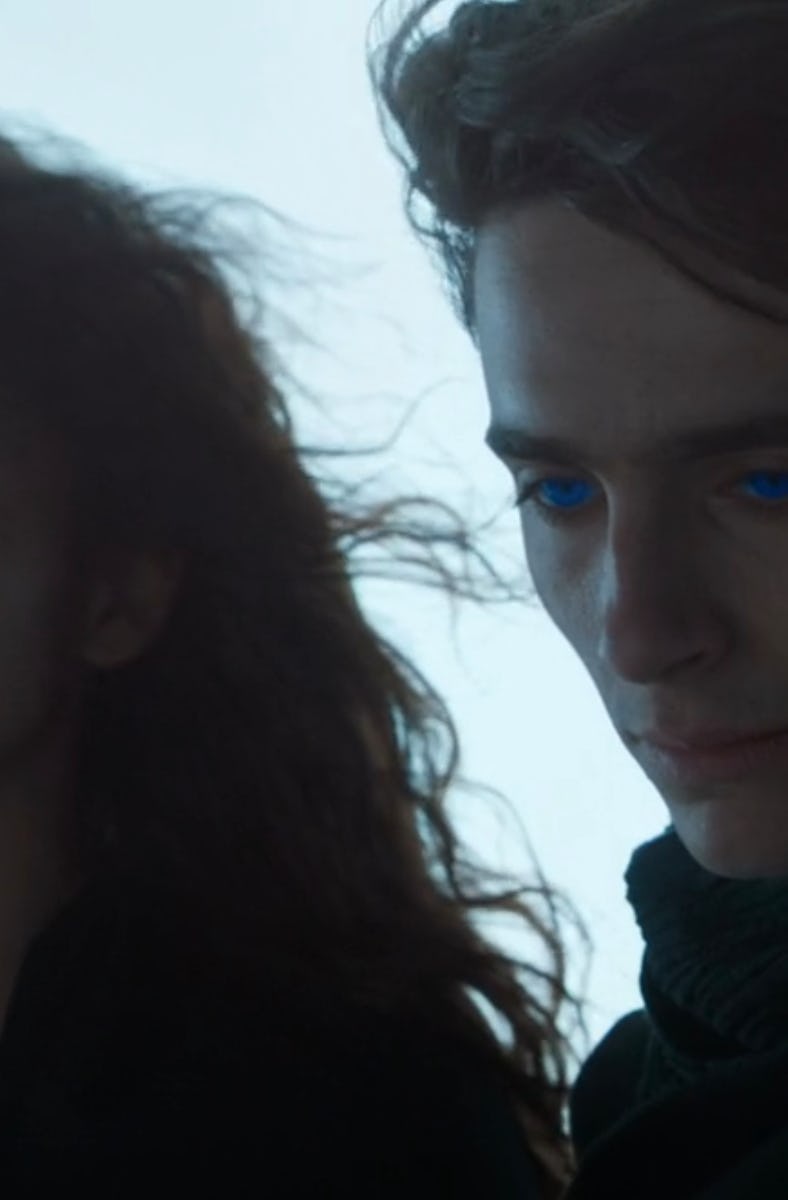Dune’s Visions Hold the Key to Its Brilliance
If Paul can see the future, what does that mean for the visions that don't come true?

Denis Villeneuve's Dune is a stunning exercise in big-screen sci-fi storytelling. It's muscular, rigorous, and unbendingly cerebral, but also surreal, lyrical, and impressively introspective. The level of clear intention visible in every frame is amazing to behold. Its images are, as many have previously noted, awe-inspiring and deeply considered, and the order of them even moreso.
Nowhere is that more obvious than in the film's handling of Paul Atreides' (Timothée Chalamet) visions of the future. The film begins with images of war and violence — of the Fremen of Arrakis fighting to unseat their House Harkonnen oppressors. These images transform into Paul's visions of Arrakis and of his future Fremen paramour, Chani (Zendaya). Viewers later learn that Paul is part of a years-spanning Bene Gesserit plan to create a mind that can bridge space and time. His visions establish and prove that he can do just that.
But in the hands of Villeneuve and his co-writers, Jon Spaihts and Eric Roth, they also serve an even greater purpose.
Jamis (Babs Olusanmokun) may not have a lot of screentime in 2021’s Dune, but his role in it is more important than you might think.
Throughout Dune's second half, Paul has visions of a friendship between him and Jamis (Babs Olusanmokun), a Fremen he hasn't met yet but who will teach him the ways of Arrakis' desert. In the film's final act, Paul finally comes face-to-face with Jamis, who challenges him to a ritual duel to the death. Paul bests Jamis multiple times, but he's informed by Stilgar (Javier Bardem) that it's impossible for their duel to end with both still alive. Eventually, Paul gives in to the darkest of his visions and embraces his violent spirit — swiftly stabbing Jamis and killing him.
At first, it's hard to know what to make of Dune's use of Jamis and, specifically, the visions Paul has of his friendship with him that will never actually come to fruition. Are they meant solely to show viewers that Paul's visions aren't always correct? Almost certainly. But that's not the only thing they do. They also subtly show viewers that Paul does have a modicum of control over his future and that he and Jamis could have been friends had he made a few different decisions. The visions he has aren't so much incorrect sometimes as they are glimpses into multiple potential futures.
The knowledge that Paul does have a number of paths laid out in front of him at all times is necessary, especially heading into Dune: Part Two. Contrary to what his story may initially suggest, Paul is not a traditionally heroic, Chosen One-esque figure. He makes several dark decisions throughout his time with the Fremen, as well as before and after his bid to take back Arrakis and avenge his father Leto Atreides (Oscar Isaac). It is, therefore, imperative that viewers know that Paul hasn't been tied to one track all along. Instead, he ends up where he does because of the decisions that he makes.
“I see a holy war spreading across the universe like unquenchable fire. A warrior religion that waves the Atreides banner in my father's name”
What's particularly brilliant about Dune: Part One's Jamis visions is how they foreshadow the ultimate arc of Paul Atreides' story without beating viewers over the head about it. Paul is a far from perfect figure in Frank Herbert's original Dune novels, and Denis Villeneuve seems intent on holding onto the character's complexity. Rather than too heavily forecasting or outright spoiling the subversive climax of Paul's journey, though, Villeneuve, Eric Roth, and Jon Spaihts found a way to set it up using Paul's precognitive abilities.
They introduce a rewarding, peaceful friendship between Paul and Jamis only to rip it away by having the former kill the latter. In other words, the trio created a beautifully circular way to simultaneously impress upon viewers that Paul is capable of committing short-sighted, wrong decisions and make them immediately feel the consequences of his actions. That's an important element of Herbert's story to establish early on, and it's something that viewers would do well to remember both before and after they witness the events of Dune: Part Two.